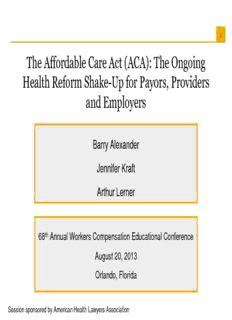
The Affordable Care Act (ACA): The Ongoing Health Reform Shake-Up for Payors, Providers and ... PDF
Preview The Affordable Care Act (ACA): The Ongoing Health Reform Shake-Up for Payors, Providers and ...
1 The Affordable Care Act (ACA): The Ongoing Health Reform Shake-Up for Payors, Providers and Employers Barry Alexander Jennifer Kraft Arthur Lerner 68th Annual Workers Compensation Educational Conference August 20, 2013 Orlando, Florida Session sponsored by American Health Lawyers Association Today’s Panelists 2 Barry Alexander Nelson Mullins Riley & Scarborough , LLP, Raleigh, N.C. Chair of Nelson Mullins’ HealthCare Practice Group Jennifer A. Kraft Seyfarth Shaw, LLP, Chicago Co-chair of Seyfarth’s Employee Welfare Benefits Practice Group Arthur Lerner Crowell & Moring LLP, Washington, D.C. Co-Chair of Crowell’s HealthCare Practice Group Agenda 3 • Introduction • Overview of Affordable Care Act’s Expansion of Health Coverage and Market Reforms • Employment-Based Coverage in a Changed Landscape • ACA Impacts on the Provider Side • Potential Impacts on Workers Compensation • Q&A Overarching Impact 4 • Opportunities for increased enrollment via subsidies, mandates, exchanges and pools • Burden of increased underwriting, enrollment/disenrollment and rate regulation • Potential for greater transparency in competition on service and price in small group and individual market segments • May disadvantage smaller insurers if they were using underwriting practices to compete in underserved niches • Potential for changes in health care delivery 5 Increased Demand for Health Insurance “Individual mandate” 6 • Beginning January 1, 2014, most U.S. citizens and legal residents must obtain and maintain “minimum essential” health insurance coverage • Individuals must get coverage for themselves and any dependents, or pay a penalty -- greater of $695 per year per family, up to a maximum of three times that amount, or 2.5% of taxable household income. • Penalty phases in over three years. • Penalty upheld by Supreme Court as a “tax” within Congress’s powers Reduced cost sharing for qualifying individuals 7 • Cost-sharing subsidies (via., e.g., adjustment out-of-pocket expense limits) are provided to individuals in new Exchanges if income exceeds 100%, but is not more than 400%, of the federal poverty line for a family of the size involved. • HHS makes payments to the health plan to cover the value of the difference. Tax credit for individual enrollees 8 • Taxpayers enrolled in qualified plan can qualify for a refundable “premium assistance” tax credit if they meet eligibility criteria. Small employer tax credit 9 • Small employers can qualify for tax credits to subsidize their contributions toward health insurance for their employees. Medicaid expansion 10 • ACA funds most costs of expansion of eligibility for Medicaid • Supreme Court rules a state that doesn’t expand Medicaid eligibility forfeits “new” ACA money, but not federal share of existing Medicaid.
Description: